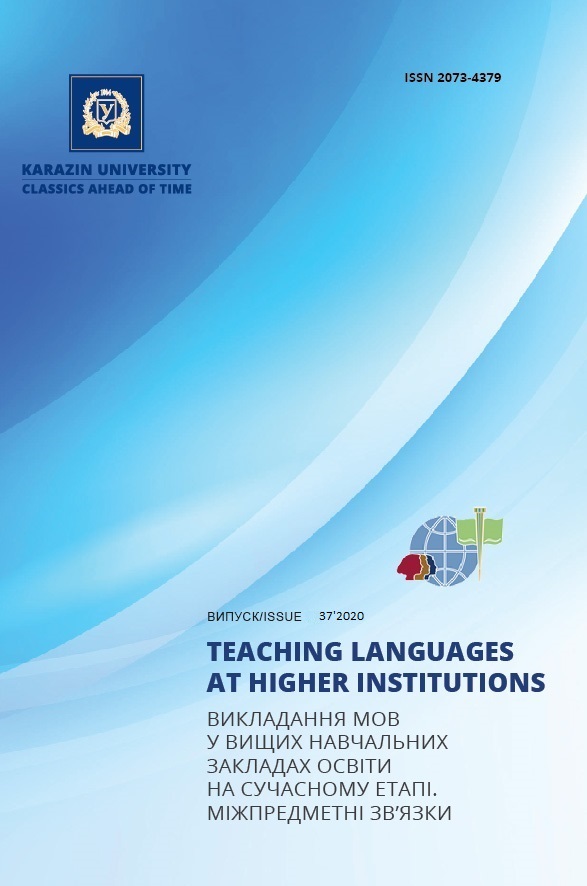The use of Classroom routines in memorization and further development of communicative competence
Abstract
The paper deals with the issue of memorization and acquisition of a target language unit by performing multiple repetitions while avoiding dullness and boredom. The author highlights the considerable role of classroom routines in memorization of target language units and further strengthening of communicative competence. Classroom routines are regarded as a powerful resource to solve a significant teaching problem connected with performing multiple repetitions and at the same time avoiding monotony.
This article aims to analyze the use of classroom daily routines in memorizing target language units and to offer a set of activities aimed at forming and developing such components of students’ communicative competence as grammatical competence (words and rules) and discourse one (cohesion and coherence).
Various methods, strategies, techniques based on multiple repetitions of the same content are taken into consideration. Special attention is paid to drilling techniques. The peculiarities of meaningful repetition are revealed and as a result, the meaningful drilling technics are offered.
Learners of foreign languages retain new language units much more successfully not by rote memorization but when they get frequent repetition of these language units, make meaningful connections to real life and when these connections are personalized. In real life, people are frequently forced to repeat the same many times while performing daily routines. Such kind of repetition is natural. In foreign language teaching performing daily routines acts like an artificial linguistic environment and can work as a kind of language immersion.
The author offers some examples of activities aimed at forming, developing, and strengthening such components of students’ communicative competence as grammatical competence (words and rules) and discourse one (cohesion and coherence). They are described in the most frequently used formats.
Classroom routines are certain to be a powerful resource to solve the problem connected with performing memorization and at the same time avoiding dullness and tedium. It is proved that well-organized daily classroom routines performing activities ensure substance memorization, not rote one. Moreover, properly organized daily classroom routines are supposed to reduce teacher talking time and consequently to increase student talking time.
Downloads
References
Arntsen, T. How to Drill. Drilling Activities for Your English Classroom. Available at: https://busyteacher.org/3812-how-to-drill-drilling-activities-for-your-english.html [Accessed 19 Aug. 2019] [in English].
Bex, M. How to Circle. Available at: https://comprehensible classroom.com/teacher-training/essential-strategies-for-tprsci-teachers/how- to-circle/ [Accessed 17 Nov. 2019] [in English].
Canale, M. (1983). From Communicative Competence to Communicative Language Pedagogy. Language and Communication. Richard, J.C. and Schmidt, R.W. (Eds.). London: Longman, 1983, pp. 2–14 [in English].
Donna, Sperandio. (2016). Use every day routines to build language skills. Posted 04.11.2016. Available at: https://blog.medel.com/use-everyday-routines-to-build-language-skills/ [Accessed 17 Nov. 2019] [in English].
Drilling. Available at: https://teffl.wordpress.com/2010/06/13/drilling/ [Accessed 12 Sep. 2019] [in English].
Fauziyah As Sa’diyah. (2019). Teaching Vocabulary Using Drilling Technique To Achieve Accuracy In Pronunciation For 2nd Grade Students In Mi Muhammadiyah 5 Surabaya. Tugas Akhir D3 thesis. Universitas Airlangga. Available at: http://repository.unair.ac.id/id/eprint/89099 [Accessed 12 Sep. 2019] [in English].
Fransiska, R. and Jurianto. (2016). The Use of Drilling Technique in Teaching English Vocabulary to the Seventh Grade Students of SMP Negeri 2 Tanggulangin. Anglicist. English Department, Universitas Airlangga, Vol. 05, No 02 (August 2016), pp. 125–131 [in English].
Harmer, J. (2007). The Practice of English Language, Teaching. Harlow: Pearson Education Limited [in English].
How Meaningful Repetition of Language Supports Comprehension and Acquisition. (2018). December 24, 2018. Available at: https://beyondlanguagelearning.com/2018/12/24/how-meaningful-repetition- of-language-supports-comprehension-and-acquisition [Accessed 10 Sep. 2020] [in English].
How to Make Input-Based Language Teaching More Efficient: Comprehensibility, Repetition, and Memorable Experience. (2019). February 20, 2019. Available at: https://beyondlanguagelearning.com/ 2019/02/20/how-to-make-input-based-language-teaching-more-efficient-comprehensibility-repetition-and-memorable-experience/-more-5964 [Accessed 10 Sep. 2020] [in English].
Kerr, Ph. Minimal resources: Drilling. Methodology: tips for teachers. Available at: https://www.onestopenglish.com/methodology-tips-for-teachers/minimal-resources-drilling/146558.article [Accessed 7 Sep. 2020] [in English].
Nasrollahi-Mouziraji, Alieh and Nasrollahi-Mouziraji, Atefeh. (2015). Memorization Makes Progress. Theory and Practice in Language Studies, April 2015, Vol. 5, No. 4, pp. 870–874 [in English].
O’shea, B. (2019). ESL Classroom Management and Routines for Young Learners. May 28, 2019. Available at: https://bridge.edu/tefl/blog/esl-classroom-management-routines-for-young-learners/ [Accessed 17 Oct. 2019] [in English].
Rhalmi, M. (2016). Drilling in English Language Teaching. Available at: https://www.myenglishpages.com/blog/drilling-in-english-language-eaching/ [Accessed 14 Aug. 2019] [in English].
Weiler, A. Value of Repetition in Language Learning. Available at: https://www.strategiesinlanguagelearning.com/repetition-in-language-learning/ [Accessed 07 Aug. 2019] [in English].
Zakime, A. (2018). What is Drilling? Available at: https://www.whatiselt.com/single-post/2018/04/15/What-is-Drilling [Accessed 17 Feb. 2020] [in English].
12 Classroom Routines to Try in the Secondary ELA Classroom. Christina, The Daring English Teacher. Available at: https://www.thedaring englishteacher.com/2020/06/12ClassroomRoutines.html [Accessed 12 Sep. 2019] [in English].

